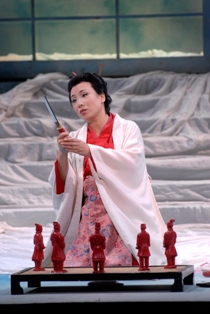
Lamos Production Makes "Madame Butterfly" Universal
Those who attended the opening of Cincinnati Opera’s summer
festival June 11 heard the traditional “Star Spangled Banner.”

They heard it non-traditionally, too, in the first production of the season, Puccini’s “Madame Butterfly,” where it is used as a motif for Lt. Pinkerton and American influence in general.
Always an audience favorite, “Butterfly” got
re-focused powerfully here in the New York City Opera production by Mark Lamos
and Michael Yeargan. Lamos (who stage
directed here in his Cincinnati Opera debut) and designer Yeargan have stripped
this sad story of its typically over-romanticized accretions and bared it for
what it is, a close up of the international sex trade. There was no fancy
scenery, no tea ceremony or Asian home-and-garden look: just a pair of shoji
screens enclosing the stage front and back with a stair unit in between. The only props were a large telescope (where
Butterfly scans the
The open, spare look, given dramatic definition by Thomas Hase’s atmospheric lighting, helped make the story universal, and focused attention on the singers and Puccini’s highly affective music.
Central to the production was soprano Shu-Ying Li as Cio-Cio San (Butterfly), a singing actress of formidable skill and temperament. In her Cincinnati Opera debut, Li paced herself vocally and physically, giving her character gentle, lyrical moments as well as pained, impassioned ones. Chinese-born Li was joined by a cast of fine singer/actors, who followed her example. Tenor Frank Lopardo as Pinkerton, the American officer who contracts a sham marriage with the 15-year-old geisha then leaves her, flaunted a beautiful lyric voice while appearing more non-entity than devil-may-care. As Suzuki, warm-toned mezzo-soprano Mika Shigematsu expressed deep concern and compassion for her young mistress. Baritone John Hancock as Sharpless, the American consul who is the “conscience” of the story, had vocal and physical authority to match (Hancock towered over everyone else on the stage the way his namesake’s signature dominates the Declaration of Independence).
Tenor Steven Cole as Goro, the “marriage broker” who strikes the deal with Pinkerton, was effectively ingratiating. Bass Alan Coulombe was fittingly menacing as Butterfly’s uncle (The Bonze), who condemns her for abandoning her Japanese faith. Baritone Kelvin Chan as Yamadori, the elderly suitor Goro tries to persuade Butterfly to marry after Pinkerton leaves, snapped his fan sharply for emphasis (Li made the same gesture at the end, when Butterfly finally sees the light).
The Cincinnati Symphony, led by conductor Edoardo Müller, was a full participant in the drama, though listeners in some parts of the hall said they overpowered the singers at times.
The turbulent
Overture set the tone, as did a sky full of dangling red battleships and a huge
disk of light against the back wall. The
disk turned symbolically red, white or blue -- dominant colors in the opera -- as
the occasion demanded. After Pinkerton
and Goro sealed the deal and Sharpless advised him against it, Butterfly
entered, American flags flowing from her headdress. After an angry scene with The Bonze and
Butterfly’s angry relatives, the disk (moon) glowed red for the love scene,
consummated atop the stairway as Pinkerton removed Butterfly’s white kimono,
revealing the red satin beneath.

Act II showed
Butterfly in modest (impoverished?) gray garb, maintaining her unshakeable
faith in Pinkerton with a touching “Un bel di.”
Tyler Backer, age six, as their son Dolore (Sorrow) added a poignant layer
of innocence and humanity, skipping happily about the stage, playing with a toy
battleship, hugging his mother and helping strew flowers in the house when
Butterfly learned that Pinkerton’s ship had dropped anchor. The Cincinnati Opera
Chorus performed the “Humming Chorus” from the gallery of Music Hall, drawing
the audience into Butterfly’s vigil against a blue moon.
The surround-sound effect continued in act III, with Chorus members in the left balcony and backstage as sailors’ voices ringing up from the harbor. In one of the loveliest stage pictures of the opera, the moon turned slowly gold as morning arrived, Butterfly steadfastly upright in her wedding clothes, Sorrow asleep on the floor in a kimono made of an American flag.
Kate Pinkerton walked in front of the glowing disk in act III (a nice touch for Pinkerton’s American wife). Falling CSO strings colored the agonizing scene where Butterfly finally “gets it” and tells emissary Sharpless to bring Pinkerton to the house to take Sorrow away. In a wrenching escalation of her final sacrifice, she called Sorrow into the room, blindfolded him, gave him a Japanese flag and slit her throat just as Pinkerton entered the room.
Repeats are 7:30 p.m. June 13 and 3 p.m. June 15 at Music Hall. Tickets may be purchased at www.cincinnatiopera.org, or call (513) 271-2742. All seats are 50% off for the Sunday matinee, which is also Father’s Day.